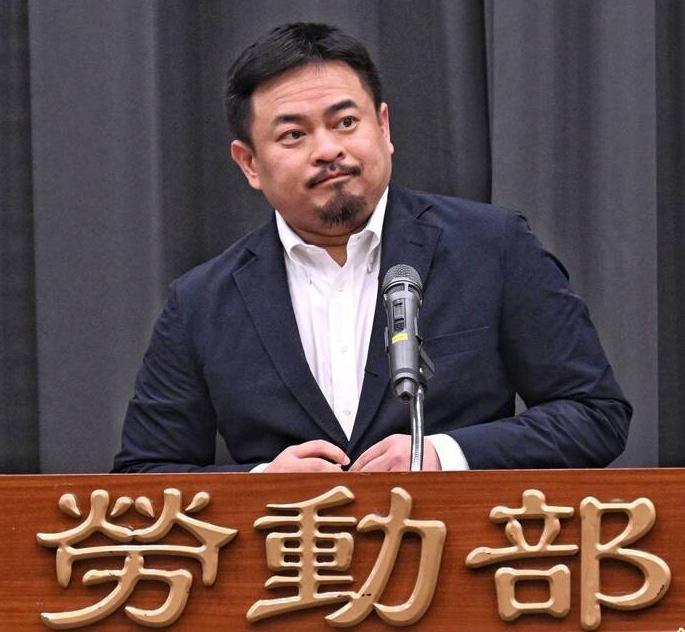Merely introducing migrant workers would not solve labor shortage issues, Minister of Labor Hung Sun-han (洪申翰) said, calling on industries to consider seniors and hiring young people part-time.
In an exclusive interview with the Central News Agency published today, Hung said that labor shortage issues need to be solved one step at a time.
The Ministry of Labor knows industries are calling for migrant workers, and is happy to conduct rolling reviews of the conditions of different industries, Hung said.

Photo: Fang Pin-chao, Taipei Times
There are two important prerequisites for introducing transnational labor, the minister said.
First, domestic workers’ employment opportunities and rights must be given first priority, he said.
Second, introducing transnational labor should not cause wages to remain stagnant or decline, he added.
In addition, it is important to protect migrant workers’ employment safety and labor rights, as they are statistically more likely to experience workplace accidents, Hung said.
According to Bureau of Labor Insurance data, from 2009 to 2018, the occupational accident rate for migrant workers in the manufacturing industry was almost twice that of domestic workers.
Many young people now prefer part-time or flexible work compared with full-time jobs, making it more challenging for businesses to find young people for full-time positions, Hung said.
This trend “shows that the younger generation values maintaining autonomy and flexibility in their lives,” he said.
Although the ministry does not encourage all businesses to offer part-time or flexible work, it “must do better” at helping companies adapt to this trend and protect labor rights, Hung said.
In particular, the ministry needs to ensure that employees have the necessary protections under the law, he said.
With Taiwan becoming a super-aged society, Hung also said he hopes companies can employ more middle-aged and elderly people, as these generations are becoming increasingly important to the nation’s labor market.

The Coast Guard Administration (CGA) yesterday said it had deployed patrol vessels to expel a China Coast Guard ship and a Chinese fishing boat near Pratas Island (Dongsha Island, 東沙群島) in the South China Sea. The China Coast Guard vessel was 28 nautical miles (52km) northeast of Pratas at 6:15am on Thursday, approaching the island’s restricted waters, which extend 24 nautical miles from its shoreline, the CGA’s Dongsha-Nansha Branch said in a statement. The Tainan, a 2,000-tonne cutter, was deployed by the CGA to shadow the Chinese ship, which left the area at 2:39pm on Friday, the statement said. At 6:31pm on Friday,

The Chinese People’s Liberation Army Navy’s (PLAN) third aircraft carrier, the Fujian, would pose a steep challenge to Taiwan’s ability to defend itself against a full-scale invasion, a defense expert said yesterday. Institute of National Defense and Security Research analyst Chieh Chung (揭仲) made the comment hours after the PLAN confirmed the carrier recently passed through the Taiwan Strait to conduct “scientific research tests and training missions” in the South China Sea. China has two carriers in operation — the Liaoning and the Shandong — with the Fujian undergoing sea trials. Although the PLAN needs time to train the Fujian’s air wing and

The American Institute in Taiwan (AIT) put Taiwan in danger, Ma Ying-jeou Foundation director Hsiao Hsu-tsen (蕭旭岑) said yesterday, hours after the de facto US embassy said that Beijing had misinterpreted World War II-era documents to isolate Taiwan. The AIT’s comments harmed the Republic of China’s (ROC) national interests and contradicted a part of the “six assurances” stipulating that the US would not change its official position on Taiwan’s sovereignty, Hsiao said. The “six assurances,” which were given by then-US president Ronald Reagan to Taiwan in 1982, say that Washington would not set a date for ending arm sales to Taiwan, consult

A Taiwanese academic yesterday said that Chinese Ambassador to Denmark Wang Xuefeng (王雪峰) disrespected Denmark and Japan when he earlier this year allegedly asked Japan’s embassy to make Taiwan’s representatives leave an event in Copenhagen. The Danish-language Berlingske on Sunday reported the incident in an article with the headline “The emperor’s birthday ended in drama in Copenhagen: More conflict may be on the way between Denmark and China.” It said that on Feb. 26, the Japanese embassy in Denmark held an event for Japanese Emperor Naruhito’s birthday, with about 200 guests in attendance, including representatives from Taiwan. After addressing the Japanese hosts, Wang